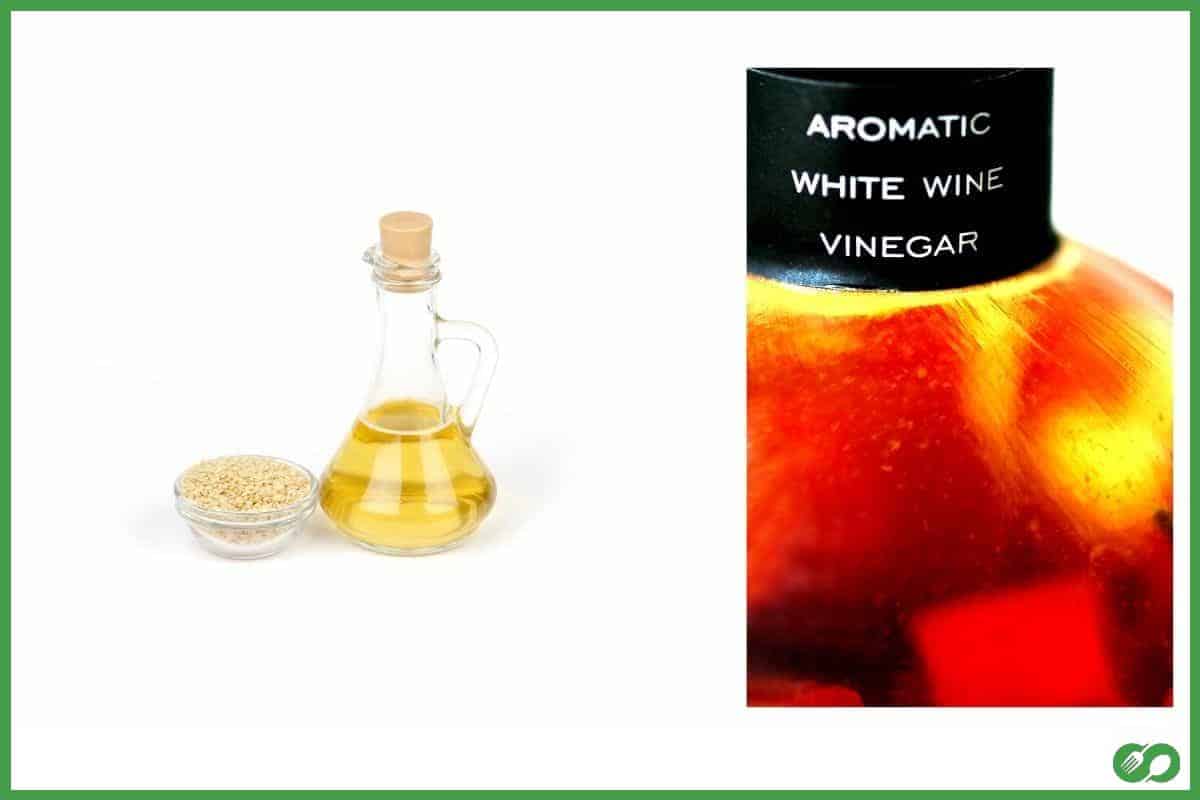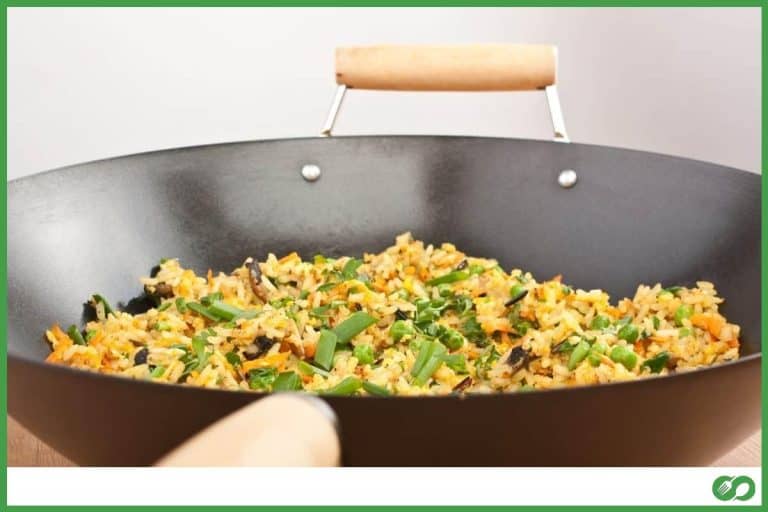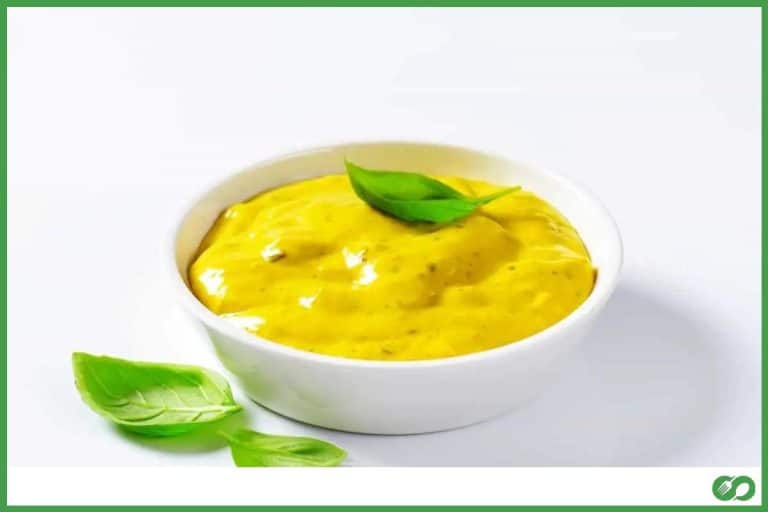Rice Vinegar vs White Wine Vinegar: (What is the Difference?)
This post may contain affiliate links which means that, if you choose to make a purchase, I may earn a small commission at no extra cost to you.
Vinegar is a pantry staple and powerhouse ingredient. It often brings much-needed acidity to a dish to brighten its flavors, is an important ingredient in many of our favorite condiments, can be used as a preservative and certain kinds of vinegar can also be great cleaning agents – vinegar can do it all!
Rice vinegar and white wine vinegar are two different types of vinegar, rice vinegar is made from fermented rice and is sweeter and has a lower acidity while white wine vinegar is made from white wine and has a sharp, more acidic flavor and intensity.
What types of vinegar are there?
If you’re wondering which vinegar to add to your pantry, rice vinegar or white wine vinegar, why not both? There are about seven common types of vinegar. While you don’t need to keep every type of vinegar on hand, it’s helpful to have a few varieties in your pantry as each type brings its own level of acidity, flavors and uses.
In the table below you’ll see the seven common types of vinegar and their different properties and uses:
| Type of Vinegar | Made From Fermentation Of | Level of Acidity | Flavor Profile | Uses |
| White | Distilled Alcohol | 5-10% | No real flavor profile. Neutral. | Cleaning, pickling, versatile in recipes. |
| Malt | Unhopped Beer | 4-5% | Acidic, malt. | Sauces, dips, fish dishes. |
| Balsamic | Grape Must | 6-7% | Sweet and more mellow. | Salad dressing, sauces, sweet dishes, paired with fruit, marinades. |
| Rice | Rice | 4-7% | Mild and slightly sweet. | Sushi, stir-fry, Asian cuisine, pickled vegetables. |
| Wine | Red or White Wine | 6-7% | Acidic and sharp. Flavor usually is dependent on the type of wine. | Marinades, meat and fish dishes, salad dressings. |
| Apple Cider | Crushed Apple Liquid (Cider) | 4-5% | Mild apple flavor. | Salad, dressings, sweet dishes, marinades. Known to be used in health supplements and hair products. |
| Flavored | Distilled alcohol (usually made using a white vinegar base) | 5-10% | Takes on the flavor of the fruit puree, herbs, or other flavoring agents used to infuse the vinegar. | Salads, sweet dishes, cheese boards, vinaigrettes, marinades. |
Is rice vinegar the same as rice wine vinegar?
When it comes to Asian cooking, in particular, you’ll often see rice vinegar and rice wine vinegar as an ingredient. Since we know that there are rice and wine types of vinegar, does this mean that rice wine vinegar is a combination of the two?
No, rice vinegar and rice wine vinegar both refer to the same type of vinegar. If your recipe calls for rice wine vinegar, you can safely use rice vinegar knowing that it’s referring to the same ingredient just by a different name. Confusing, I know!
There is a distinction to be made from rice wine which is made from fermented rice instead of grapes or fruits. The fermented rice results in a mild, sweet wine and is a popular cooking ingredient in Asian cuisines. You don’t want to mix up your use of rice wine vinegar and rice wine as they bring opposite flavors to your dish – one acidic and one sweet.
What is seasoned rice vinegar?
If you’ve been shopping for rice vinegar, you’ve probably noticed a similar-looking product – seasoned rice vinegar. So what’s the difference?
Rice vinegar is a great staple ingredient to have in your pantry, while seasoned rice vinegar can be considered more of a condiment. Seasoned rice vinegar is rice vinegar with the addition of sugar and salt or MSG. Seasoned rice vinegar is most popularly used for seasoning sushi rice but is also used in salad dressings and marinades and sometimes on its own as a dipping sauce.
So is rice wine vinegar the same as white wine vinegar?
Even though rice vinegar sometimes gets referred to as rice wine vinegar, it’s not made from fermenting wine. So while it may have the appearance of white wine vinegar, it has a much different flavor and acidity.
White wine vinegar has a 6-7% acidity level with a much sharper and more harsh acidic flavor than rice vinegar with 4-7% acidity and a mild and sweet flavor. These two characteristics alone make it so that white wine and rice wine vinegar are typically used in much different capacities and to complement different dishes.
Rice vinegar’s delicate flavor is great for rice dishes, soups, and stir-frys. White wine vinegar compliments meats like chicken, and is great in marinades and dressings. Both kinds of vinegar complement fish and can be used in pickling vegetables, but results will differ in the intensity of flavor and acidity.
How can I use vinegar?
It’s a widely known principle that good, balanced cooking incorporates salt, acid, heat, and fat, there’s even a popular cookbook and Netflix show about it! So the popularity of vinegar comes from its ability to bring that sour, acidic element to dishes – but how else can you use vinegar?
Tip: Acidity does a great job of brightening up a dish and cutting through salt and sugar if you’ve accidentally added a bit too much salt or sweetness. Before you toss your dish, try adding a bit of acidity with vinegar or lemon.
- Vinegar can help tenderize meats and fish, making it a great addition to marinades, especially when working with a tougher cut of meat.
- Vinegar is a popular ingredient in many of your favorite condiments – salad dressings and vinaigrettes, sauces, mayonnaise, even ketchup and barbeque sauce!
- Vinegar is often used to help in preserves and pickling as it can extend shelf life with its bacteria-killing properties.
- Cleaning! Distilled white vinegar is a powerful, non-toxic and cheap cleaning and disinfecting agent! While it doesn’t disinfect all bacteria and viruses there are studies to show its effectiveness against certain ones such as certain food-borne pathogens.
What can I substitute for rice vinegar?
If you’re in a pinch and find yourself making a recipe that calls for rice vinegar but you don’t have any on hand, what can you use? While a lot of people may just omit the ingredient altogether is that really the right choice?
Can I use white wine vinegar instead of rice wine vinegar?
Now that you know that rice vinegar and rice wine vinegar are the same thing, and rice wine vinegar isn’t made from wine at all, would substituting white wine vinegar be a good choice?
Yes, you can use white wine vinegar as a substitute for rice wine, however, it carries a much harsher flavor than the delicate sweetness and mild acidity of rice vinegar. If you’re using white wine vinegar in place of rice vinegar make sure to use less of it – starting with about ½ the amount it calls for of rice vinegar and adjusting to taste from there.
What is the best substitute for rice vinegar?
If white wine vinegar isn’t the best substitute for rice vinegar, what is? To decide this, we have to look at both the acidity level and the flavor profile of the vinegar. Rice vinegar has one of the lowest acidity levels among common types of vinegar, and a sweetness to it that contrasts a lot of its more harsh alternatives.
When we look at acidity and flavor profile, one common type of vinegar (that you probably have in your pantry!) proves to be the closest substitute for rice vinegar – apple cider vinegar. Apple cider vinegar shares the same 4-7% acidity and has a fruity sweetness to it from the apples it’s fermented from. Apple cider vinegar can be substituted 1 to 1 for rice vinegar in most recipes.
What is the best substitute for white wine vinegar?
If you don’t have white wine vinegar on hand, what can you use? Like we answered previously, you can use rice vinegar as a substitute, however, its milder and sweeter flavor will not produce the same result in all recipes.
If you’re cooking a dish where the vinegar is meant to really cut through and balance out the other components of the dish you may find that you need to use more rice vinegar than they call for white wine vinegar. Add the amount of rice vinegar that is called for in the recipe and adjust to taste.
If you have red wine vinegar on hand, this will be your best substitute. In most cases, red wine vinegar has the same amount of acidity with a slightly richer flavor. However, this rich flavor will often lend itself well to recipes that call for white wine vinegar such as chicken or vegetable dishes or stews.
Conclusion
When it comes to rice vinegar and white wine vinegar, there are far more differences than similarities. However, as you learned, that doesn’t mean they can’t be used as a substitute for each other with a few tweaks.
You don’t need to stock your pantry with every type of vinegar out there, learning about which ones lend themselves well to the types of dishes that you regularly make is worth it. If you make a lot of Asian cuisines – rice vinegar will be a staple, if vinaigrettes or braised chicken recipes your go-to – white wine vinegar is a must-have.







